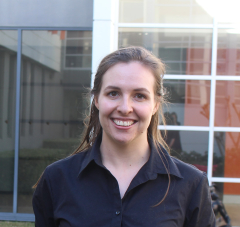Please tell us a little about yourself
I began a research role at the Black Dog Institute in August 2019 working on the LifeSpan Suicide Prevention trial. During this time I had the opportunity to lead a qualitative investigation into patient and carer experiences when attending the Emergency Department (ED) during a suicide crisis. It quickly became apparent that parents of adolescents experiencing suicide crisis (suicidal thoughts, feelings, and behaviours) faced more unique challenges than other carers. Having personal experience of accompanying a loved one to the ED during their suicide crisis, I was shocked to see that the challenges my family had faced over a decade ago, were challenges still faced by parents today. I was excited to be able to develop this PhD project to further explore parents’ experiences and to work alongside parents to co-create a tool which could support them during this extremely distressing time.
Please tell us about your research
Parents are typically the primary support person for adolescents. However, they are unlikely to be equipped to deal with the life altering experience of having a child in suicide crisis. The decision to visit an emergency department (ED) is usually made at the peak of crisis when parents are feeling the least capable of keeping their child safe. Yet, while children are often discharged from the ED back into the care of their parents, parents are rarely offered support to provide ongoing care to their child or to maintain their own mental wellbeing. As such, the aim of this project is to understand the unique experience of parents when they accompany an adolescent child, who is in a suicide crisis, to the ED.
After building this understanding I will work with parents to co-create a tool which meets their needs to support their child and themselves during and immediately following the visit to the ED.
What are the real-world applications of your research?
While there has been no research conducted to date to indicate what type of support parents require during and/or immediately following an ED visit for their child in suicidal crisis, we can assume that by better equipping parents with tools to support their child or themselves during this time will improve outcomes for adolescents. The final phase of the project will involve co-creating a digital tool with parents which meet their needs during and/or immediately following the ED visit. We hope that by empowering parents, they can provide more effective care for their child outside of the ED and help reduce hospital re-presentations for suicide crisis and suicide deaths.
How do you see your research aligning with Tyree IHealthE?
This research aligns the strongest with the Connected Health pillar. The focus on collaborative and tailor-made health solutions with a focus on the end user excites me the most. We know that co-creating tools with the end user creates better quality products that most accurately met user needs. I’m excited to use the support from Tyree to contribute to designing a relevant, meaningful, and effective tool for parents who accompany an adolescent who is in suicide crisis to the ED.
How do people get in touch with you?
On Twitter @DemeeRheinberg1

